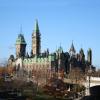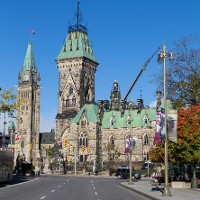
IIASA organized two panels at the first online Canadian Science Policy Conference (CSPC) 2020. These offered participants the opportunity to join a live policy simulation about complex Arctic policies and explore horizon scanning, foresight, and scenario mapping as tools to solve the multifaceted issues of tomorrow.
 © Mike Clegg | Dreamstime
© Mike Clegg | Dreamstime
The COVID-19 pandemic has mobilized scientists and policymakers to rapidly adapt to large-scale and complex issues. Reflecting on decisions made and looking forward to the short and long term future post-COVID, The Canadian Science Policy Conference (CSPC) 2020 theme this year is “New decade, New Reality”.
As one of the largest science and policy innovation conferences, CSPC2020 brought together over 2,500 participants from across the globe to discuss how science and policy can work together to provide solutions and new perspectives for the years to come. IIASA organized two panels at CSPC 2020. The first explored intricate science and policy issues relating to the Arctic through a social simulation. The second brought together international experts to discuss the role of horizon scanning, foresight, and scenario mapping across sectors and examine their contribution to tackling the challenges of tomorrow.
This event took place virtually:
CSPC panels are recorded and made available to registered conference participants who could not attend the meeting live.
Helping Societies Address Cascading Climate Risks from Outside Geopolitical Boundaries: Case Study on the Arctic (Interactive Policy Simulation)
16 November 2020, 14:30-16:00 CET – 8:30-10:00 EST
Climate change impacts are both global and regional in nature, and do not stop at geopolitical boundaries. Societies, however, react in very geopolitical ways, often having a better understanding of how climate change will impact their geopolitical regions without as clear a view of how external stressors will play out and influence local outcomes.
This session used a policy simulation as an international/transboundary foundation, grounding participants in a timely real-world complex situation where they explored how globally relevant climate change impacts (Arctic) occurring beyond a geopolitical region, as well as the economic and social responses to these impacts, might cascade into its geopolitical space. The simulation exercise created opportunities for creative exploration of new ideas for better science-policy interface taking into account intertwined complexity of the coupled natural-human systems.
Learn more about the topic by reading the editorial authored by the panelists.
Panelists included:
- Nicole Arbour, External Relations Manager, IIASA
- Monica Gattinger, Director, Institute for Science, Society and Policy and Professor, University of Ottawa
- Brendan Frank, Senior Research Associate, Institute for Science Society and Policy, University of Ottawa
- Piotr Magnuszewski, Program Leader, Centre for Systems Solutions, Research Scholar with the Risk and Resilience Program, IIASA
- Tim Giger, Sustainability Expert, Centre for Systems Solutions (CRS)
Don't forget to watch the event video highlights below:
The Importance of Imagining the Future: Horizon Scanning, Foresight and Scenario Mapping in a Rapidly Changing Wicked World
19 November 2020, 14:30-16:00 CET – 8:30-10:00 EST
There has never been a time in history when long-term critical thinking has been more needed to address complex challenges. Globally, humanity is facing multifaceted, wicked problems, involving multiple stakeholders (often with competing interests), interdependencies and uncertain future prospects. Engaging with these challenges strategically today to identify and prepare for a variety of possible future scenarios – can help develop agility in policy-making that reflects todays volatile and uncertain world.
This panel explored some of the practical ways that horizon scanning, foresight and scenario mapping are currently being used by academia, industry, governments and international organizations to plan for uncertainties and build towards shared global futures. It also explored how these tools can and are being applied to help in policy development in different contexts regionally and globally and how these approaches bring together multiple stakeholders towards shared goals.
Learn more about the topic by reading the editorial authored by the panelists.
Panelists included:
- Anu Shukla-Jones, Senior Policy Analyst, Cross-Functional Policy Mobility Program, Government of Canada
- Mauricio Antonio Lopes, Senior Researcher, Brazilian Agricultural Research Corporation – Embrapa
- Jean-Louis Trudel, Writer-in-Residence, Institute for Science, Society and Policy, University of Ottawa
- Amanda Palazzo, Research Scholar, with the Ecosystem Services and Management Program, IIASA
- Luke Tay, Principal Futurist, Singapore Food Agency
- Cat Tully, Founder, SOIF
IIASA and Canada, since 2010
• IIASA researchers have collaborated with over 30 research partners in Canada.
• 12 Canadian students have participated in the Young Scientists Summer Program (YSSP), which develops the research skills and networks of talented PhD students. For the YSSP and the Postdoctoral Program, IIASA gives preference to applicants from member countries.
• 121 Canadians have visited IIASA and participated in IIASA organized events.
• IIASA researchers have visited Canada 62 times to attend conferences, present their research, and to discuss research collaborations and activities.
• Canadian-IIASA collaborations have results in more than 200 publications.
Upcoming Events
Austrian Academy of Sciences, Dr. Ignaz-Seipel-Platz 2, 1010 Vienna

